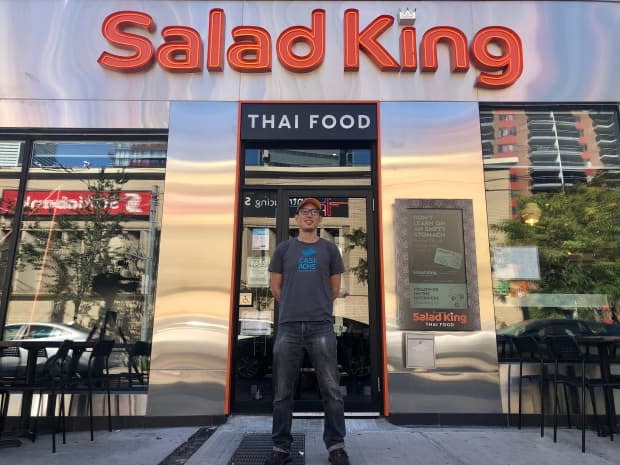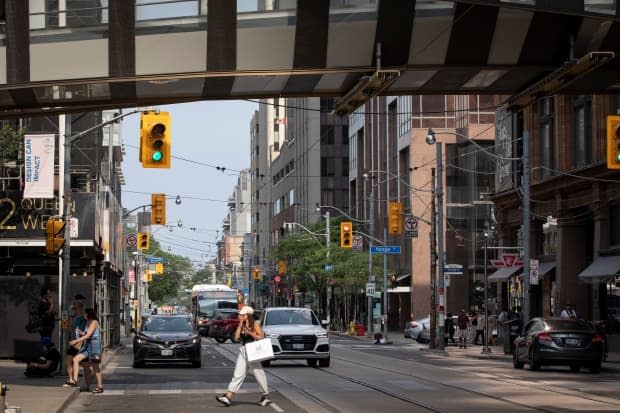Downtown Toronto business owners, associations call on federal parties for more help

Downtown business owners and associations are questioning why federal election candidates aren't promising more support for establishments in Toronto's core, many of which are still struggling to stay afloat during the COVID-19 pandemic.
With the federal campaign coming to an end and election day set for Monday, some are wondering what a new government will mean for businesses in downtown Toronto — and if there will be focused efforts to revitalize the area and support local firms through recovery.
Ken Kelly, project manager of the International Downtown Association, says the downtown core is the barometer of a city's economic, cultural and social well-being.
"Every community has got so much wrapped up on its main street in its downtown," Kelly said. "For that reason, we need our elected officials to be paying more attention to how the issues identified in the election tie so directly to our downtown."
Kelly said he was surprised he has not heard much about downtown recovery during the campaign, adding that he would like to see the next federal government work closer with local businesses to ensure downtown Toronto bounces back.
The kitchen at Thai restaurant Salad King is still slower than usual, despite a return to classes in person, managing director Alan Liu told CBC Toronto.
The restaurant, steps away from Ryerson University on Yonge Street, has been hit hard by the pandemic. Liu said about 75 per cent of the restaurant's customers are students, office workers and people visiting the core area.
"There's just so much unknown because we're reliant on people coming into the area to help our business," Liu said.
About nine per cent of downtown office employees have returned to work in person, according to data collected by the Strategic Regional Research Alliance (SRRA).

COVID-19 saw a dramatic drop in the number of workers in all sectors in the downtown core.
During the height of the pandemic, the downtown employment cluster, which operates at 80 per cent occupancy in "normal times," was operating at just four per cent according to the SRRA.
Steps away from the restaurant is the busiest intersection in the country, and foot traffic has been cut in half.
In August 2019, before the COVID-19 pandemic, nearly five million people walked across Yonge and Dundas Streets in comparison to 2.9 million people this August, according to the Downtown Yonge BIA.
"We want downtown to recover. We've got to really accelerate that," Liu said.
"At the rate we're going, we don't think we're going to get back the business we need, probably until spring of next year."
Salad King opened up its second location six months ago on Queen Street West.
Liu said new businesses would benefit from more federal subsidies to ensure there will be fewer empty storefronts.
How the 3 major parties would support downtown recovery
CBC Toronto asked the three major parties what they plan to do to help support downtown businesses and revitalization.
The Conservative party said it would introduce the Rebuild Main Street Tax Credit, an incentive that would see a 25 per cent tax credit and interest-free loans.
If re-elected, the Liberal party has promised to extend the Canada Recovery Hiring Program to March 31, 2022, to provide the tourism industry with extended wage and rent support of up to 75 per cent.
Meanwhile, the NDP is the only party that wants to continue COVID-19 business benefits such as the wage subsidy "until the pandemic is truly over," the party said in a statement to CBC Toronto.
Mark Garner, chief operating officer of the Downtown Yonge BIA, said August is usually the busiest month for Dundas Square.
"The challenge we've got is, I've got to create consumer and community confidence to get people back into this destination because without our big tourism drops, the big festivals and events and people reconvening, those economics don't come back," Garner said.

One of the biggest issues impacting downtown establishments is social inequity, Garner said.
"We need supportive housing for people that have mental health and addictions. We'd like to see more money from the federal government to be put toward supportive housing," he said.
In order to revitalize and recover the downtown core, Garner said work must be done around getting people to be comfortable coming back to downtown Toronto and support for small businesses who have been the hardest hit.
"It's incumbent on the federal government during this election to understand the importance of downtowns and make sure they're putting money in the areas to help recover our economy across Canada."

 Yahoo Movies
Yahoo Movies 